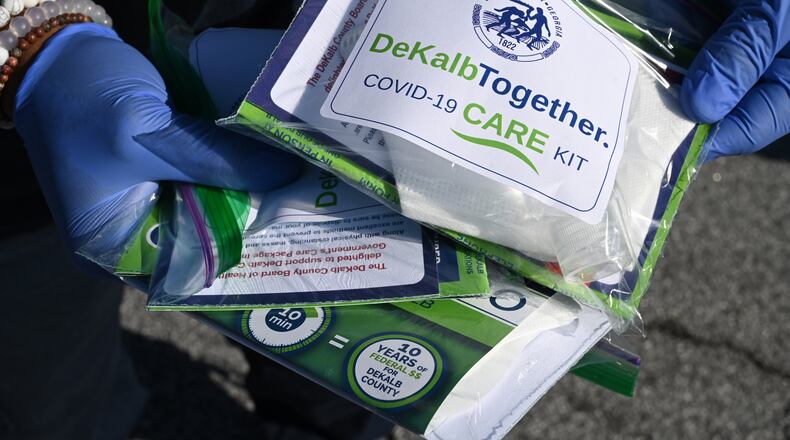DeKalb commissioners agreed Tuesday to give local cities a cut of the county’s federal coronavirus aid money.
The vote was unanimous — but begrudging for some.
“I’m not against giving the cities some money,” Commissioner Mereda Davis Johnson said. “But I do understand that at the end of the day the buck stops with us, and we’ll be held responsible for how the money is spent.”
Under the arrangement negotiated by DeKalb CEO Michael Thurmond and the DeKalb Municipal Association, local cities will receive a total of $32.6 million of the more than $125 million of federal CARES Act funds that the county received in late March. The money will be divided among the cities on a per capita basis, giving them much-needed funds to address unexpected costs created by the coronavirus pandemic.
PREVIOUS COVERAGE: Coronavirus aid money brings relief, confusion to local governments
DeKalb and the metro area’s other largest jurisdictions — Cobb, Fulton and Gwinnett counties, as well as the city of Atlanta — all received direct relief allocations from the federal government. That left smaller cities, including those in the aforementioned counties, wondering for months if they would get their own cut.
Georgia Gov. Brian Kemp finally answered that question late last month when he unveiled a plan for distributing a share of the state’s CARES Act funds to smaller jurisdictions. His plan, though, told cities in Cobb, DeKalb, Fulton and Gwinnett to ask their counties for help.
In less than a week, Thurmond and DeKalb’s mayors had negotiated their agreement and sent it to county commissioners for their approval.
They got it Tuesday, after plenty of debate.
Several commissioners took issue with allocating cities money because the county provides — or plans to provide — services like COVID-19 testing, food distribution and small business relief to all residents, whether they live inside municipalities or not.
“I’m not a fan of this formula,” Commissioner Kathie Gannon said.
Commissioner Jeff Rader worried about the county and cities duplicating efforts, and about municipalities potentially focusing on some issues and ignoring others.
“I think that disparity will be frustrating to some people,” he said.
MORE COVERAGE: DeKalb awards $2.7M to local nonprofits that help with rent, utilities
County officials said the plan is to follow up the resolution adopted Tuesday with specific intergovernmental agreements in which cities will outline their general plan for spending CARES funds. But like several of her colleagues, Commissioner Lorraine Cochran-Johnson said she was “very disturbed” that more stipulations were not put in place.
DeKalb County, she said, will ultimately be held responsible if the money isn’t spent according to the federal guidelines that accompanied the funding.
“All we have here are allocations without any rubric or metric for accountability of how the funds are spent,” Cochran-Johnson said.
DeKalb cities will undoubtedly use their allotted funding to cover expenses like hazard pay for frontline workers, personal protective equipment and additional safety measures in government buildings. But during recent meetings, local mayors also agreed that working with the county as much as possible on the response to COVID-19 is a good idea.
CEO Thurmond has expressed faith in city leadership and chided commissioners Tuesday, urging them to stop quibbling and get the ball rolling.
“We have to act,” Thurmond said. “And we have to act at the speed that the COVID-19 virus is spreading.”
About the Author
Keep Reading
The Latest
Featured



